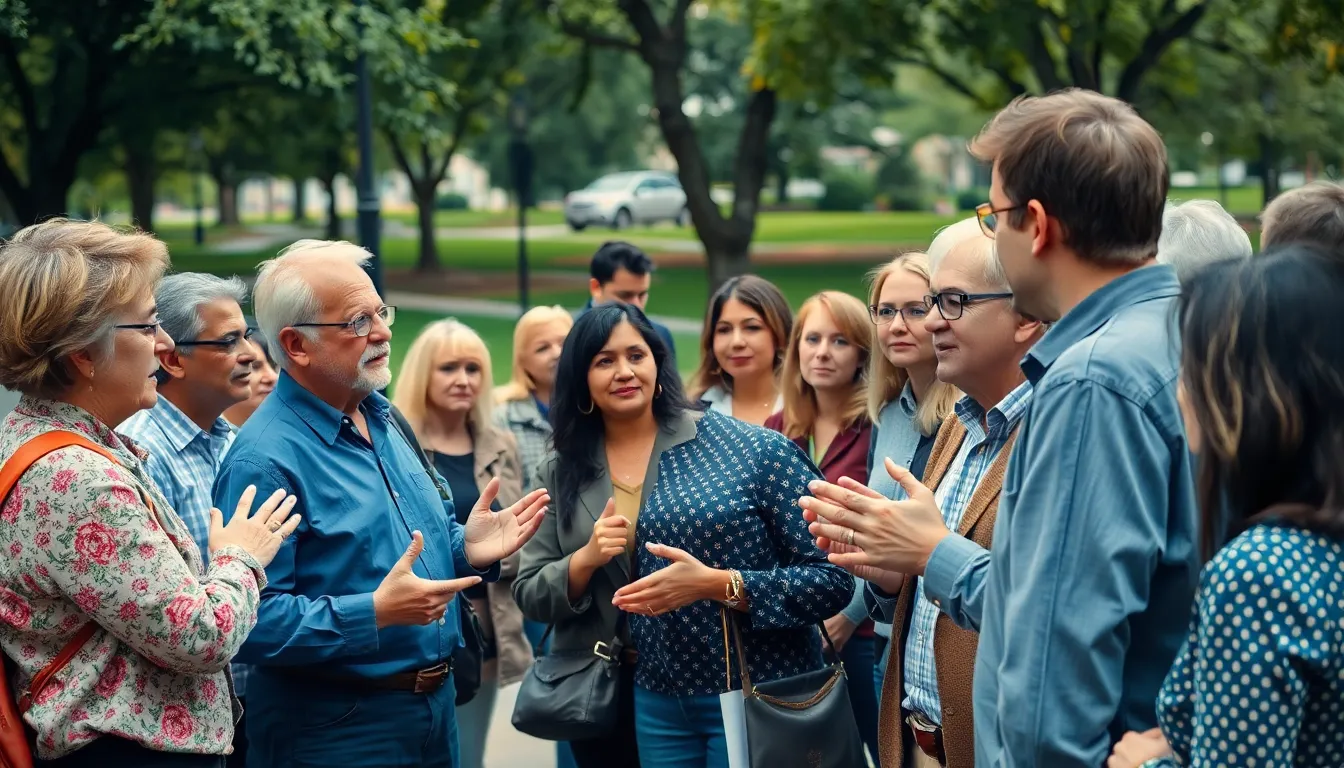Table of Contents
ToggleIn a world overflowing with voices, the art of opinion expression stands out like a flamingo at a penguin party. Everyone’s got something to say, but not everyone knows how to say it effectively. Whether it’s sharing thoughts on the latest blockbuster or debating the merits of pineapple on pizza, expressing opinions isn’t just a pastime; it’s a vital part of communication.
But let’s face it—navigating the landscape of opinions can feel like walking a tightrope. One wrong step and you might find yourself in a heated debate or, worse, a social media meltdown. Fear not! This guide dives into the nuances of opinion expression, helping readers articulate their thoughts with confidence and a dash of humor. So grab a cup of coffee, sit back, and get ready to transform those opinions into engaging conversations that resonate.
Understanding Opinion Expression
Effective opinion expression holds significant value in today’s diverse society. Communicating thoughts clearly fosters understanding and promotes engaging discussions.
Definition and Importance
Opinion expression refers to the act of voicing personal beliefs or perspectives. This process plays a crucial role in social interactions and democratic discourse. Clear articulation of opinions encourages critical thinking and nurtures healthy debate. It empowers individuals to share insights, influencing decisions and policies. When people express their thoughts thoughtfully, they contribute to collective knowledge and awareness. A respectful exchange of opinions cultivates an environment where diverse viewpoints coexist.
Forms of Opinion Expression
Several methods exist for expressing opinions. Verbal communication, whether in person or through platforms like podcasts, facilitates direct dialogue. Written formats, including blogs and articles, allow for detailed examination of viewpoints. Visual expressions, such as infographics and videos, engage audiences creatively. Social media platforms enable rapid sharing of thoughts, broadening reach. Each form caters to different contexts, making it easier for individuals to choose the most effective method for their message. Understanding these diverse methods aids in enhancing communication skills.
The Role of Opinion Expression in Society

Opinion expression plays a vital role in shaping societal interactions and democratic ideals. It empowers individuals to share their views and promote dialogue.
Freedom of Speech
Freedom of speech ensures that individuals can express their opinions without fear of retaliation. This fundamental right supports an open exchange of ideas, which is essential for democracy. Citizens debate political issues, social justice matters, or environmental concerns freely. Additionally, diverse opinions foster creativity and innovation in various fields. This environment encourages collaboration, enabling society to progress. Moreover, legal frameworks protect opinion expression, affirming its significance in promoting tolerance and understanding.
Impact on Public Discourse
Public discourse benefits greatly from well-articulated opinion expression. Engaging discussions stimulate critical thinking and challenge societal norms. They allow communities to confront issues collaboratively, leading to meaningful change. Different perspectives raise awareness about various topics, enhancing empathy and consideration for others’ viewpoints. Furthermore, constructive debates influence policies, encouraging leaders to reflect on constituents’ needs. Ultimately, rich public discourse paves the way for informed decision-making and societal advancement.
Challenges to Opinion Expression
Expressing opinions faces multiple challenges that can hinder clarity and effectiveness. Key factors include censorship and the influence of social media, both of which significantly shape how individuals share their thoughts.
Censorship and Restrictions
Censorship poses a significant barrier to opinion expression. Many governments impose restrictions on free speech, targeting dissenting voices and limiting public discourse. Fear of retaliation often leads individuals to self-censor, stifling open conversations about critical issues. Legal frameworks may also suppress candid discussions, as individuals navigate potential repercussions. Societal norms around acceptable opinions further complicate this landscape, as expressing unpopular views can lead to social ostracism. These factors contribute to an environment where genuine dialogue is often overlooked.
The Influence of Social Media
Social media platforms act as double-edged swords in expressing opinions. They provide a space for diverse voices but also amplify negativity and misinformation. Algorithms often prioritize sensational content, drowning out thoughtful discussions. Many users encounter harassment or trolling, discouraging authentic engagement. Moreover, the fear of backlash can cause individuals to withhold their opinions, resulting in a culture of conformity. Online echo chambers further limit exposure to varying perspectives, which stifles healthy debate and understanding. Thus, while social media fosters connectivity, it also presents significant challenges to genuine opinion expression.
Best Practices for Healthy Opinion Expression
Effective opinion expression cultivates engaging conversations that enrich society. Following best practices enhances communication and fosters understanding.
Encouraging Open Dialogue
Open dialogue begins with creating safe spaces for individuals to express thoughts. Engaging with others in discussions invites diverse viewpoints, making conversations more vibrant. Questions can promote reflection and deeper understanding. Listening actively demonstrates respect for opinions, encouraging others to share unconcealed thoughts. Affirmation of valid points, even amidst disagreement, builds rapport and reduces defensiveness. Thoughtful responses can pave the way for constructive exchanges. Transparency about personal beliefs encourages others to voice theirs candidly.
Respecting Diverse Perspectives
Respecting diverse perspectives enhances communication and broadens understanding. Embracing different backgrounds and experiences elevates discussions, fostering comprehensive understanding. When individuals acknowledge contrasting viewpoints, it affirms their worth, promoting mutual respect. Avoiding dismissive language signals openness to new ideas. Curiosity about others’ beliefs encourages learning and growth. In addition, striving for empathy during disagreements helps maintain constructive dialogues. Recognizing common ground can unite people despite their differences, ultimately enriching public discourse.
Effective opinion expression is vital in today’s diverse society. By articulating thoughts clearly and respectfully, individuals can foster meaningful discussions that enrich public discourse. Embracing different perspectives not only enhances understanding but also nurtures empathy among individuals.
Navigating the complexities of opinion expression requires awareness of the challenges posed by censorship and social media dynamics. However, by encouraging open dialogue and creating safe spaces for conversation, people can overcome these barriers.
Ultimately, the ability to express opinions thoughtfully empowers individuals to influence change and contribute to a more informed society. Engaging in respectful discussions can lead to greater collaboration and creativity, paving the way for a more inclusive environment where everyone’s voice matters.




